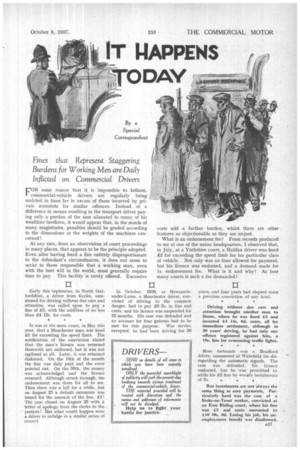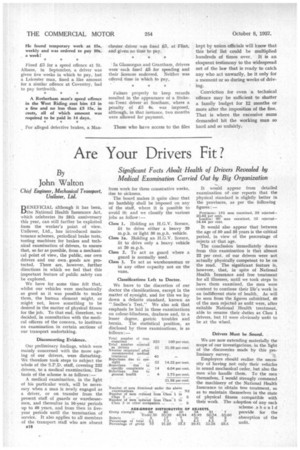T i4APPENS
Page 51

Page 52

If you've noticed an error in this article please click here to report it so we can fix it.
TO DAY
Fines that Represent Staggering Burdens for Working Men are Daily Inflicted on Commercial Drivers
FOR some reason that it is impossible to fathom, commercial-vehicle drivers are regularly being mulcted in fines far in excess of those incurred by private motorists for similar offences. Instead of a difference in means resulting in the transport driver paying only a portion of the sum allocated to many of his wealthier brethren, it would appear that, in the minds of many magistrates, penalties should be graded according to the dimensions or the weights of the machines concerned t At any rate, from an observation of court proceedings in many places, that appears to be the principle adopted. Even after having fixed a fine entirely disproportionate to the defendant's circumstances, it does not seem to occur to those responsible that a working man, even with the best will in the world, must generally require time to pay. This facility is rarely offered. Excessive costs add a further burden, whilst there are other features as objectionable as they are unjust.
What is an endorsement fee? From records produced to me at one of the union headquarters, I observed that, in July, at a Yorkshire court, a Halifax driver was fined £2 for exceeding the speed limit for his particular class of vehicle. Not only was no time allowed for payment, but his licence was endorsed, and a demand made for is. endorsement fee. What is it and why? At how many courts is such a fee demanded?
Early this September, in North Staffordshire, a driver from Eccles, summoned for driving without due care and attention, was called upon to pay a fine of £3, with the addition of no less than E4 12s. for costs.
It was at the same court, in May this year, that a Manchester man was fined £1 for exceeding the speed limit. The notification of the conviction stated that the man's licence was returned therewith not endorsed, but it was not enclosed at all. Later, it was returned endorsed. On the 10th of the month the fine was duly paid and the error pointed out. On the 30th, the money was acknowledged and the licence returned. Although struck through, the endorsement was there for all to see. Then there was a lull for a while, .but on August 23 a default summons was issued for the amount of the fine, £1 ! The case closed on August 25 with a letter of apology from the clerks to the justices! But what would happen were a driver to indulge in a similar series of errors: In October, 1936, at Newcastleunder-Lyme, a Manchester driver, convicted of driving to the common danger, had to pay £9 2s in fine and costs, and his licence was suspended for 12 months. His case was defended and an account for four guineas had to be met for this purpose. War service excepted, he had been driving for 26 years, and four years had elapsed since a previous conviction of any kind.
Driving without due care and attention brought another man to Stone, where he was fined £5 and incurred £4 14s. 0d. costs, all for immediate settlement, although in 20 years' driving, he had only one offence registered against him, a 10s. fine for overruning traffic lights.
More fortunate was a Bradford driver, summoned at Wakefield for disregarding the automatic signals. The case was defended, his licence endorsed, but he was permitted to settle his £2 fine by weekly instalments
of 5s. *
But instalments are not always the same thing as easy payments. Par. ticularly hard was the case of a Stoke-on-Trent worker, convicted at an East Riding court, where his fine was £5 and costs amounted to £10 19s. Gel. Losing his job, his unemployment benefit was disallowed..
He found temporary work at 1.5s. weekly and was ordered to pay 10s. a week!
Fined £3 for a speed offence at St. Albans, in September, a driver was given five weeks in which to pay, but a Leicester man, fined a like amount for a similar offence at Coventry, had to pay forthwith.
A Rotherham man's speed offence in the West Riding cost him £3 in a fine and no less than £3 15s. in costs, all of which amount was required to be paid in 14 days.
, For alleged defective brakes, a Man cheater driver was fined £5, at Flint, and given no time to pay.
In Glamorgan and Grantham, drivers were each fined £5 for speeding and their licences endorsed. Neither was offered time in which to pay.
Failure properly to keep records resulted in the appearance of a Stokeon-Trent driver at Southern, where a penalty of £3 4s. was imposed, although, in that instance, two months were allowed for payment.
Those who have access to the files
kept by union officials will know that this brief list could be multiplied hundreds of times over. It is an eloquent testimony to the widespread net of the law that is ready to catch any who act unwarily, be it only for a moment or so during weeks of driving.
Conviction for even a technical offence may be sufficient to shatter a family budget for 12 months or more after the imposition of the fine. That is where the excessive sums demanded hit the working man so hard and so unfairly.




























































































